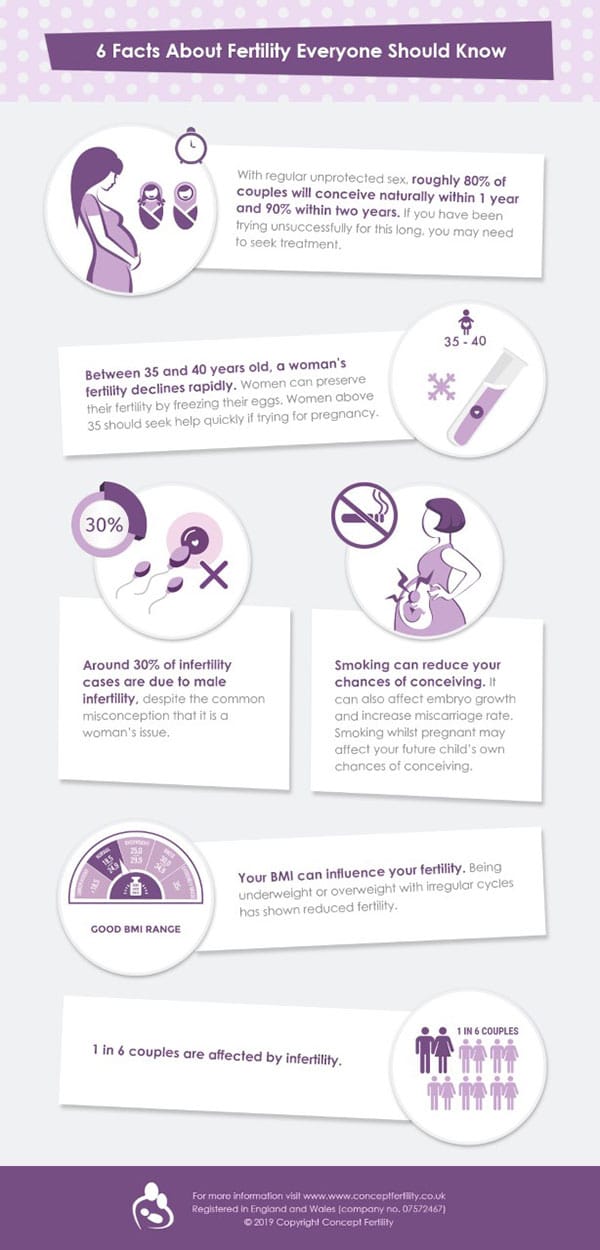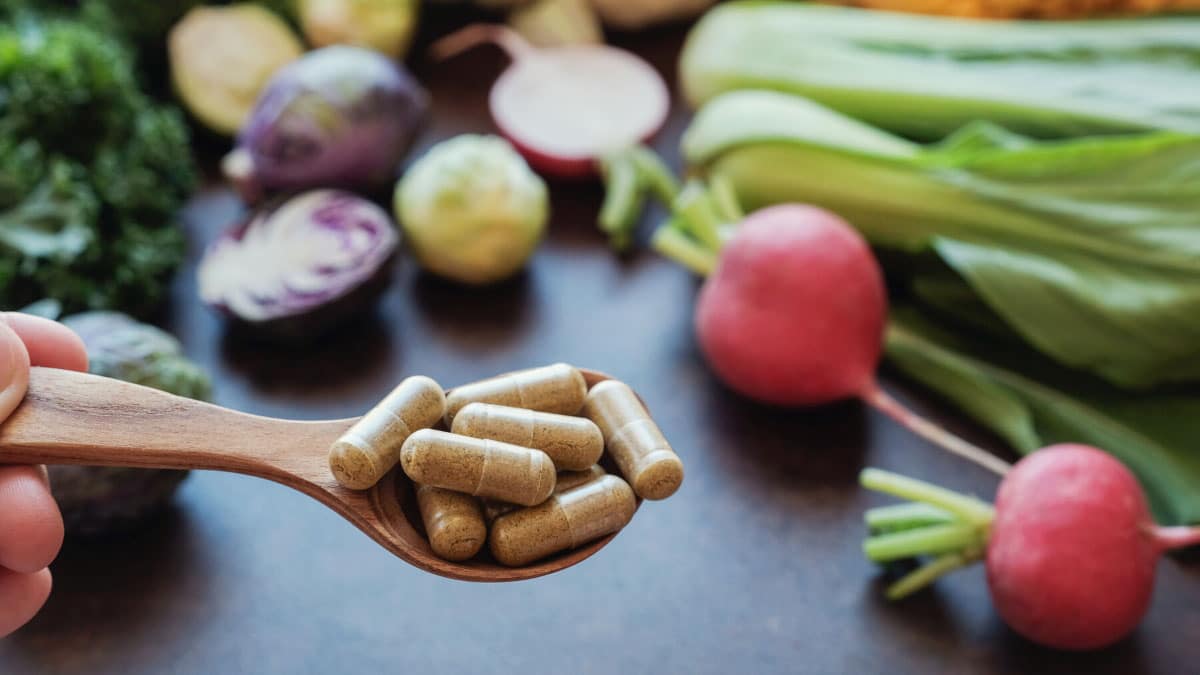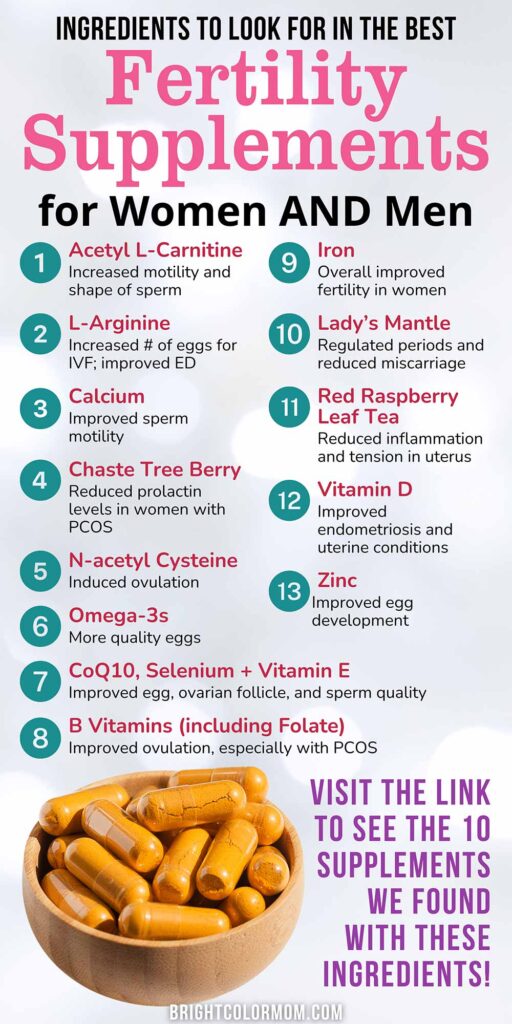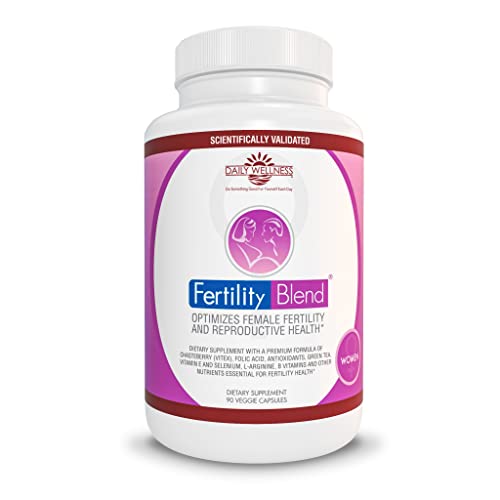If you’re looking for the best fertility supplements out there, I’m guessing you’re either struggling to get pregnant or hoping there are vitamins or pills you can take to get pregnant fast. For the former, let me just say – you are not alone! My husband and I tried for months to get pregnant with our first child, and over 6 million women struggle with infertility each year in the U.S. alone.
This post may contain affiliate links. If you make a purchase after clicking one, I may receive a small commission at no cost to you.
If you’re the latter, please know that while fertility vitamins and supplements can improve egg quality, help ovulation, and generally increase your chances of getting pregnant, there is no guarantee it will happen fast. If you have regular 4-week cycles and are able to get a positive result with an ovulation predictor test, taking fertility supplements can actually hurt your chances of getting pregnant right away by messing with your natural cycle and hormone production.
Most fertility vitamins and supplements (including the ones on this list) are available over-the-counter. You can walk into Walmart right now and get fertility drugs. Why is it so easy? Because the vast majority of fertility boosters are just specific combinations of commonly found vitamins and enzymes that help regulate the two hormones involved in conception and pregnancy.
They are also NOT FDA-evaluated and approved, because the FDA doesn’t regulate supplements. So ALWAYS talk to your doctor before trying a new supplement, even if you don’t need a prescription!
Types of Fertility Supplements
Home remedies for fertility can include pills, powders, herbal teas, and essential oils. Even a change in diet can provide nutrients that increase fertility. True, the strongest fertility pills would have to be prescribed by your doctor, but your body may not even require a megadose of any particular vitamins in order to get pregnant.
Remember that once you are pregnant, your vitamin and nutrient needs will change quite a bit. I’ve got a great article on the best prenatal vitamins for you, including recommendations based on your specific needs!
So what are the best fertility supplements? I’ve done a massive amount of research on available vitamins and herbs for fertility and provided reviews and ratings below. Factors involved in each rating include:
- How it’s taken/ingested
- Affordability
- Reported effectiveness
- Reported risks and side effects
Top Picks for Best Fertility Supplements (at a Glance)
What Fertility Supplements Do
(If you’re already familiar with fertility supplements and just want to see my detailed product reviews, click here.)
For that matter, what are fertility supplements? “Supplement” is just a fancy word for a collection of vitamins and nutrients. Some supplements can be a higher dose of a single vitamin but are often a cocktail of related vitamins, nutrients, and even herbs.
Fertility supplements increase fertility by improving the health of reproductive organs and tissues. They can be used for men AND women, though men need a slightly different combination of vitamins. For women, fertility supplements target the eggs, ovaries, and production of hormones. Specifically, they can help regulate the production of estrogen and progesterone, the primary hormones involved in conception and pregnancy. For men, fertility supplements usually target sperm health.
If you’re still unsure what fertility means, that’s 100% normal. I struggled with this in my brain for a long time. After all, it’s not like your body is made of dirt and you can just chug some Miracle Grow to make getting pregnant a cinch. Fertility refers to whether or not a woman is releasing quality eggs to be fertilized each month (ovulate), or whether or not a man’s sperm has the ability to fertilize the egg (inseminate).
Now you know!
Anyway, the thing to remember about using supplements for fertility is that they are not foolproof. They don’t cure infertility and they don’t guarantee a pregnancy – or even that you will get pregnant fast. Go into this process with a lot of patience and as little stress as possible, because stress may contribute to infertility!
If you’re interested in trying some of the suggestions below that are simple vitamins, ask your doctor for a prescription! You might be able to get it for free (and even if it’s $4 at Walmart, money saved is money saved).
Disclaimer
This article provides general information and discussions about health and related subjects. The information and other content provided in this article, or any linked materials, are not intended and should not be construed as medical advice, nor is the information a substitute for specific professional medical expertise or treatment.
If you have a medical concern, consult your healthcare provider or seek other professional medical treatment. Never disregard professional medical advice or delay seeking it because of something you’ve read on this website or in any linked materials. If you think you may have a medical emergency, call your doctor or emergency services immediately.

Fertility Supplements FAQ
Q: Do fertility supplements work?
That really depends on your definition of fertility success. Will these supplements get you pregnant? No, because they cannot, themselves, fertilize your egg. Can these supplements improve your overall health, thereby increasing your chances of developing and releasing healthy eggs each month? Many of them can!
Q: What about DHEA?
There’s just not enough evidence that DHEA (dehydroepiandrosterone, a hormone) provides any improvement to fertility, and there are plenty of unpleasant side effects. For these reasons, I won’t recommend it in this article.
Q: Are any of these fertility supplements any better than my regular multivitamin?
For many women, a simple prenatal vitamin can help them get pregnant by providing a wide array of vitamins and nutrients the body needs. If you know you have specific infertility issues and you’re trying to treat them naturally, a fertility supplement with a specific combination of vitamins and nutrients may be better suited to your needs.
Q: Are fertility supplements safe?
Virtually all vitamins for fertility can be found over-the-counter (OTC) and are safe to use as instructed by the manufacturer. However, vitamin overdose is a real thing and you should always consult your doctor before adding a slew of vitamins to your daily regimen.
Q: Are fertility supplements better than prescription fertility meds?
The main differences between OTC and prescription fertility pills are the dosages and the cost.
Prescriptions are required for certain fertility pills (like Clomid) as well as for megadoses of vitamins. You should be talking to your doctor about any plans you have for introducing new supplements, so this isn’t a big deal. But you’ve probably seen whole rows at your supermarket dedicated to basic vitamins and herbal supplements, which you can purchase over-the-counter.
As far as cost, some prescriptions can be pricey (a Clomid refill can cost $10-$100), but getting a prescription for vitamins can actually make them FREE! With both of my pregnancies, I had to take massive amounts of iron supplements (three times a day). Even though I could get a bottle of Spring Valley iron pills for $4 at Walmart, whenever I used my doctor’s prescription (for the same dosage), the bottle would be free.
But even within over-the-counter fertility products, the costs can vary significantly. There are a lot of brand-name pills and drinks pushing combinations of vitamins and nutrients that expectant mothers swear by, and their prices go up as demand increases.
Let’s dive deep into some of the best-selling fertility supplements on the market right now – and we’ll also go over the worst that you should steer clear of!
Best Fertility Supplements in 2025
1. One-a-Day Men’s & Women’s Pre-Pregnancy Pack
- One a day pre pregnancy multivitamin couple’s pack contains two sets…
- For her, One a day women’s Prenatal multivitamins are the OB/GYN…
- For him, One a day men’s pre conception Health with powerful…
- Adding a prenatal multivitamin to expecting mother’s daily routines is…
- Contains 30 one a day women’s prenatal multivitamin softgels and 30…
Who it’s for: Heterosexual couples trying to get pregnant together
How it’s taken: As the name suggests, each person takes one pill a day by mouth
Main ingredients: Calcium and Omega-3 Fish Oil in women’s; Calcium and Magnesium in men’s
Review: This One-a-Day couples pack is the most-recommended prenatal pack for couples by OBGYNs, and one of the most trusted vitamin brands in America. While the pills do have a number of “unnecessary” ingredients (like maltodextrin and corn starch), there’s nothing dangerous or that you wouldn’t find in any other processed food in your kitchen.
Rather than target ovulation issues, the women’s capsule contains ingredients that aid in general healthiness just as any other prenatal would, and is safe to take throughout your entire pregnancy. The real magic is in the men’s tablet – it contains a cocktail of ingredients designed to increase sperm count and motility. There’s a high reported rate of success with this pack, often within the first month of using it.
You’re not likely to have any side effects when taken as directed. They can have a strong odor, though, thanks to the Omega-3 Fish Oil – so down ‘em quick.
The best part of this pack? The price! It’s around 50 cents per pill – that’s a dollar a day for BOTH of you to enhance your fertility. Doesn’t get much better than that!
2. Pycnogenol
- Supports vascular health – Pycnogenol supports healthy aging and…
- What Is Pycnogenol? Life Extension’s Pycnogenol helps your body…
- Provides antioxidant protection – Pycnogenol helps fight free…
- Ingredients matter – We use only the finest raw ingredients with the…
- Live your healthiest life – We believe the answers to a healthier…
Who it’s for: Men trying to get their partner pregnant, particularly those with malformed sperm cells
How it’s taken: One capsule by mouth per day
Main ingredients: Just Pycnogenol!
Review: Synthesized from French Maritime Pine Bark Extract, this supplement is focused on a single natural ingredient that has been shown to increase the quality and effectiveness of men’s sperm.
To be clear, this herb does not increase sperm count; rather, it helps men produce sperm that are structurally normal, rather than bent or inactive. In fact, men who took this supplement in one study reportedly had the same sperm count, but their numbers of normal sperm cells doubled.
Users (including women) also report a number of other benefits – clearer skin, increased energy, and reduced allergy symptoms. Side effects are nill. This supplement can be pricy, but Walmart carries a bottle that is under $10 (when it’s in stock).
3. Concepta Solutions Women’s Fertility Boost
- ★ THE SOLUTION HAS ARRIVED – Our leading formula decreases stress,…
- ★ WHY CONCEPTA – Providing you with over 1500 mg of vitamins,…
- ★ BEST VALUE ON AMAZON – Get the biggest bang for your buck and…
- ★ NON-GMO & VEGAN FRIENDLY – Our herbal blend is made with proven…
- ★ 100% SATISFACTION GUARANTEED – We’re so confident that…
Who it’s for: Women trying to get pregnant with hormonal imbalances
How it’s taken: Two capsules per day by mouth
Main ingredients: Maca Root, Myo-Isotinol, and Chaste Tree Berry
Review: Maca root! Now there’s a unique ingredient. While it doesn’t contribute to female fertility per se, it DOES increase libido – so it might lead to more enjoyable baby-making. Other ingredients can affect hormone production and utilization of insulin, so if your cycles are already regular, you probably don’t need these capsules. You’ll also want to avoid this supplement if you have thyroid issues.
While the ingredients in this fertility supplement can help improve ovulation, you should stop taking it once you’re pregnant. The listed potential side effects may seem extensive, including stomach pain, headaches, and fatigue, but they are rare. Furthermore, this is one of the only fertility supplement companies that are upfront about potential side effects.
Concepta Solution’s Fertility Boost is very affordable at around 11 cents per pill.
4. Pregnitude Reproductive Support Dietary Supplement
- IMPROVE YOUR CHANCES OF CONCEIVING | Pregnitude Reproductive Support…
- PROMOTE CYCLE REGULARITY & EGG QUALITY | If You’re Experiencing…
- A MORE ENJOYABLE WAY TO BOOST FERTILITY | The Most Frustrating Part of…
- 60 CONVENIENT TAKE-ALONG PACKETS | Each Box Arrives with [60]…
- DOCTOR RECOMMENDED & OB/GYN APPROVED | Have Peace of Mind on Your Path…
Who it’s for: Women trying to get pregnant, particularly those with PCOS
How it’s taken: Two packets per day mixed in a beverage (one in the morning and one in the evening)
Main ingredients: Folic Acid and Myo-Inositol
Review: This product is a lifesaver for women who struggle to take pills and are sensitive to tastes. These packets have absolutely zero flavor and can be mixed in anything from plain water to a fruit smoothie.
Myo-Inositol is one of the more powerful fertility supplements. It helps the body use insulin effectively, which is particularly beneficial to women with PCOS. If your cycles are already regular and you don’t have insulin problems, though, you might want to pass on this drink mix. Both Myo-Inositol and folic acid have been known to improve egg quality, and that’s all that’s in these packets, so their claims are valid.
The main reported side effects of Pregnitude are stomach pain and diarrhea, but they’re not common. The price is moderate at just $1/day (around 50 cents a packet).
5. Premama Fertility Support Vegan Drink Mix
- START YOUR JOURNEY: Begin your fertility journey confidently with…
- IMPROVE EGG QUALITY: Support your egg health with Fertility Support…
- ESSENTIAL NUTRIENTS: Packed with key vitamins including Folate, a key…
- EASY-TO-USE: Convenient on-the-go daily packets, ensuring you get the…
- TRUSTED FORMULATION: Our multivitamin supplement is manufactured in…
Who it’s for: Women trying to get pregnant, particularly those with PCOS
How it’s taken: One packet mixed in a drink of your choice per day
Main ingredients: Folic Acid and Myo-Inositol
Review: You might as well read the review for Pregnitude above because these drink mixes have the exact same ingredients (quick read: it’s awesome, but don’t drink it if your cycles are regular). The only difference is Premama is one packet per day, while Pregnitude is two. This means Premama has the advantage of being cheaper per day.
6. Fairhaven FertilAid, MotilityBoost, and CountBoost
- Long-Trusted Male Fertility Supplements: A popular men’s dietary…
- Daily Nutritional Supplements for Male Health: Designed to be taken…
- Clean Vegan Formula: Our Mens fertility supplement are free from…
- Quality You Can Rely on: Our Men prenatal vitamins products are…
- A Trusted Brand Since 2003: Fairhaven Health is dedicated to providing…
Who it’s for: Men who want to increase their sperm count and quality
How it’s taken: Seven capsules once a day by mouth
Main ingredients: B-Vitamins, Zinc, and D-ribose
Review: The ingredients used are no-fluff and backed by science. Zinc will almost certainly increase a man’s sperm count, and the various other vitamins and elements can contribute to increased sperm motility as well.
These are pricey at over $2 per total dose – which is a whopping seven pills per day.
7. Best Nest Wellness Mama Bird Herbal Fertility Blend
- Complete Prenatal Support Supplement: A complete multivitamin…
- Formula with Folate & More: Each prenatal supplement serving provides…
- Supplement for Brain Support: Formulated with l-methylfolate to…
- Digestive Support for Pregnant Women: Organic herbs, probiotics, and…
- Vegan Prenatal Support Formula: Whole-food-based, once-daily capsules…
Who it’s for: Women trying to get pregnant
How it’s taken: One pill by mouth per day
Main ingredients: Vitamins A, B, C, D, E… and all the others you need
Review: This appears to be a fairly normal prenatal at first glance, but the ingredients are actually superior. Instead of folic acid, it uses methyl folate, a more bioavailable ingredient that can be consumed by women with MTHFR. It’s vegan now that they get their Vitamin D from lichen. It also contains probiotics and gentle organic herbs, like chamomile.
Thousands of women have had a positive experience with Mama Bird. Some have balked at a study reporting high levels of lead in Best Nest products, but Best Nest has clearly responded to these findings with concern that Ellipse Analytics has a conflict of interest in doing the study in the first place. They hold steady to their claim that their products contain far less lead than the allowable daily limit. Frankly, their glowing reviews from real users speaks volumes.
Reported side effects include migraines and joint pain, but these are uncommon. Mama Bird is expensive at over $1 per pill.
8. Conceive Plus Ovulation Support for PCOS
- BALANCED & REGULAR OVULATION SUPPORT: Our Women’s Ovulation Support…
- REPRODUCTIVE HEALTH FOR ALL WOMEN: Strengthen your female reproductive…
- AID NATURAL CONCEPTION: Formulated to assist with natural conception,…
- REDUCE MENSTRUAL DISCOMFORT: The combination of myoinositol, vitamin…
- INOSITOL SUPPLEMENT FOR WOMEN: Vegan, Dye-free, Gluten-free,…
Who it’s for: Women trying to get pregnant that have PCOS
How it’s taken: Four capsules daily with food
Main ingredients: Myo-Inositol, a form of Folate, and CoQ10
Review: Conceive Plus tablets are meant to help increase fertility in women who don’t already have a regular cycle, such as women with PCOS. In that sense, it’s comparable to Pregnitude and Premama, but this is the only one that specifically states it’s primarily for PCOS. This pill also has ginger root, though, which can help ease severe menstrual pain, acting as an anti-inflammatory and antioxidant.
As with a lot of the fertility supplements on this list, many of the negative reviews are a result of women with healthy, regular cycles taking these supplements intended to regulate women who need that help. It’s got a good combo of ingredients and is likely worth a try for women with PCOS.
Conceive Plus is also on the pricey side at over $1/day, and you must take four capsules a day.
9. Pink Stork Fertility Tea
- 1 out of every 6 couples have trouble conceiving – and Pink Stork…
- Not just an ordinary vitex supplement, our herbal tea helps nourish…
- We only use organic, natural herbs packaged in compostable,…
- We offer natural fertility supplements for women – you can pair…
- Pink Stork is here to support you through this life-changing journey….
Who it’s for: Women trying to get pregnant who do not currently ovulate
How it’s taken: Drink 1-3 cups of tea per day.
Main ingredients: Red Raspberry Leaf and Chaste Tree Berry
Review: These are mint-flavored tea bags filled with 100% organic ingredients. They’re presweetened with organic stevia as well! ALL ingredients are natural herbs. That being said, this tea seems to work best for women who don’t ovulate on their own, because it can alter your hormone production. If your cycle is already regular and you get a positive result at any point in your cycle with an ovulation predictor test, you do not need to drink this tea.
You’ll also need to take a general prenatal containing folic acid in conjunction with this tea to prepare for pregnancy, as it doesn’t contain any vitamins or minerals your body needs. As for side effects, most women don’t report any – but a small percentage do report severe cramping during the ovulation cycle.
The price isn’t bad at just over $1 per cup of tea, and most women enjoy the flavor without any added sweeteners.
There are a LOT of fertility teas out there, and if you struggle to swallow pills every day, drinking a hot cup of tea or two each day may be better for you. Check out our article on the best teas for fertility to find the perfect tea for your conception needs!
10. Fertility Blend Supplement
- Fertility Booster Supplement for Women – Developed for women ages 25…
- Herbal & Vitamin Fertility Blend – Formulated with a blend of amino…
- Hormone Balance Progesterone Pills – Increase your chances of getting…
- Women Hormone Balance Supplements – Take 3 capsules daily. Our…
- Conceive with Your Partner – Contains 90 veggie capsules for healthy…
Who it’s for: Women trying to get pregnant with irregular cycles
How it’s taken: One capsule three times a day by mouth
Main ingredients: L-Arginine, Green Tea Extract, and Chaste Berry Extract
Review: While Fertility Blend contains a lot of the same supplements as others on this list, Green Tea Extract stands out. But it makes sense as an ingredient: it’s an antioxidant that can help regulate hormone production, increase metabolism, and reduce anxiety. A lot of women have reported success within 2-3 months of taking these pills.
Once again, this supplement is not for women who already have regular cycles with ovulation periods. It can mess up your natural flow. Most customers don’t report any negative side effects, though, when taken as directed.
Fertility Blend has become more affordable since its initial release and is around $1/day for a three-capsule dose.
Worst Fertility Supplements
PregPrep Complete Conception Fertility Aid
PregPrep is actually a “kit” of two different types of pills that work together with the intention of improving fertility. One, FertilPrep, is taken throughout your entire cycle (30 days), while the other, VitaPrep, is taken in the 10 days leading up to ovulation.
This fertility supplement was formulated by doctors, and they mention cervical mucus a LOT. The N-acetyl cysteine is supposed to thin cervical mucus, making it easier for sperm to reach an egg. The company also claims this supplement is safe to take in addition to your regular prenatal vitamin.
As for their actual effectiveness, these pills have a disproportionately high number of women reporting that they did not get pregnant (compared to other fertility supplements). Many also said they messed up their regular cycles with a common side effect being that their periods started immediately, even though this company doesn’t say their product is not for women with regular cycles.
Unless you’ve noticed your cervical mucus still seems particularly thick during ovulation (something you’d have to monitor yourself for a few months to determine), this probably isn’t worth your money.
Eu Natural’s CONCEPTION Fertility Prenatal Vitamins
CONCEPTION’s primary benefit is that it improves the reproductive cycle in women with irregular periods. The capsule has no fillers or artificial ingredients, and the herbal extracts are capsulized fresh – so you may notice a strong smell. If preferred, you can empty the capsule contents into a smoothie instead of swallowing whole. In addition to the above ingredients, it also contains vitamins B and D, zinc, iron, selenium, and folic acid. Eu Natural doesn’t test on animals, is vegetarian, and made in the USA.
However, this fertility supplement has a particular ingredient that throws up a big red flag: ashwagandha. WebMD rates this herb as likely unsafe during pregnancy as it has been linked to an increased risk of miscarriage. Many women with normal cycles that took this supplement reported the total disappearance of their periods while continuing use. Unfortunately, Eu Natural doesn’t list either of these issues as potential side effects. The company also encourages women to continue taking the supplement throughout the entire first trimester, despite the known link to miscarriage.
If your periods are out of whack and you’re trying to get them back on track, this supplement may be worth a try – but you should discontinue use once you have a normal cycle. I definitely do not recommend this supplement for women with regular periods.
Cassava Twins Organic Fertility Supplement
First of all, know that the claim made by Forever Blessed of an increased chance for twins has not been approved by the FDA – and I’d wager they wouldn’t pass the scrutiny. And even though the company claims cassava can cause hyperovulation (releasing multiple eggs per cycle), it still won’t guarantee you get pregnant with twins. Worse: that claim has pretty much no scientific basis.
Cassava is fairly safe to ingest when prepared properly but can cause cyanide poisoning if not done just right. As this is an unregulated product from a small company, it’s difficult to know how well the cassava root in these capsules is prepared.
While you may find a lot of positive reviews around the web about the effectiveness of these pills, there’s evidence these reviews were obtained with a promise of a 90% off coupon – though the reviews that stated this have mysteriously disappeared.
Conclusion? Don’t waste your money or risk your health on a company trying to profit off of desperate women.
Ingredients and Vitamins to Look For
These are what I like to call the ABCs of fertility! The specific ingredients of the recommended fertility supplements above can sometimes target different areas of infertility, from cellular health to hormone regulation. See if any of the elements below sound like they could help with your particular fertility needs, then check back in the list above for the products that include the ingredients you need.
These ingredients (or simple vitamins) can also usually be found as individual supplements at your local pharmacy. They contribute to overall health in addition to hormone production and reproductive health. Many are for men OR women, some specifically for women, and some just for men.
Acetyl L-Carnitine
L-carnitine is an amino acid naturally produced by the body, which can turn into acetyl-L-carnitine and vice versa. It helps the body create energy, improving brain and heart health. It can also aid in weight loss.
Reported benefits: Within a year of taking acetyl-L-carnitine regularly, sperm have shown increased motility and better shape, which can increase the chances of one getting to an egg. It can also increase blood flow to the ovaries.
Potential side effects: Nausea, dry mouth, headache, and restlessness can occur (think of how you feel after a mega-dose of caffeine). It can also cause the body to produce a fishy odor.
Dosage: 1 gram by mouth daily, with variations based on specific causes of male infertility
L-Arginine
This amino acid is obtained by eating red meat, fish, poultry, and dairy. It’s mostly used in treating high blood pressure and preeclampsia.
Reported benefits: It can improve erectile dysfunction in men, making it possible to achieve conception. Early research also suggests it can increase the number of eggs to be collected for IVF.
Potential side effects: Bloating, diarrhea, gout, and low blood pressure can occur.
Dosage: This supplement should not be used in conjunction with blood pressure medication. At least 5 grams per day are recommended for erectile dysfunction. Much higher doses are needed for potential ovulation benefits and should be discussed with your doctor.
Antioxidants (including CoQ10, Selenium + Vitamin E)
Antioxidants, like Coenzyme Q10, reduce oxidative stress to the cells, preventing damage to the cells and body functions. The body produces some of its own, and it can also be found in some fruits and vegetables. Selenium is a mineral found in earth and water, as well as red meats, seafood, and nuts. Vitamin E is found in a variety of foods and can repair damaged cells.
Reported benefits: Antioxidants help rid the body of free radicals caused by things like internal inflammation and external exposure to pollution or UV rays. Extremely limited evidence suggests there could be an increase in the likelihood of getting pregnant and a slowing of ovarian aging, as well as a decrease in the risk of a miscarriage.
CoQ10 in particular shows clearer results for improvement of egg and embryo quality. For men, they increase sperm quality. Elevated selenium levels have been found in large, healthy ovarian follicles that are most conducive to egg development and release.
Potential side effects: Specific high-dose antioxidant supplements, like beta-carotene, have been linked to an increased risk of certain cancers or stroke. Normal doses typically have no side effects.
Dosage: If using a supplement, go by the label, as each product is different. For CoQ10 specifically, the recommendation is 100-200 mg per day, but can be as high as 600 mg for fertility treatment. However, you may get the same benefits simply by eating more antioxidant-rich foods like dark chocolate, berries, and kale. Selenium has a recommended dietary allowance of 55 mcg per day, but up to 400 mcg per day is considered safe. 15 mg per day of vitamin E is enough.
B Vitamins (including Folate/Folic Acid + Inositol)
B vitamins are super important to being healthy in general, so they’re certainly important when you’re trying to get pregnant! They include 8 different B-[number] vitamins. The most important B vitamin is folate, the synthetic version of which is folic acid (what’s in your vitamin). Folate is the naturally occurring version of the vitamin in your food. Inositol, also known as vitamin B8, is also important in the regulation of hormones, insulin, and blood pressure.
Reported benefits: You’re more likely to ovulate when you’re getting enough B vitamins – and that’s a pretty important part of making a baby. B vitamins can even protect your body from dangerous pesticides you inadvertently ingest! And once you’re pregnant, having adequate stores of folate in your body is what ensures your baby’s neural tube develops properly. Inositol is well-documented as an aide in ovulation and reduced blood pressure for women with PCOS.
Potential side effects: If you take more than the recommended dose on your supplement for a long period of time, nerve damage can occur.
Dosage: Each B vitamin has a different recommended daily amount, but for folic acid – the most important one – aim for 400-600 mcg (micrograms) a day, along with up to 4 grams of Myo-Inositol.
Calcium
You probably already know calcium is important for your bones and teeth. But it also helps your heart beat and your blood clot, and our bodies don’t produce any on their own.
Reported benefits: This one is actually for the men! While women are more at risk for bone breakage as they age, the motility of a man’s sperm can be affected by a lack of calcium intake.
Potential side effects: Hardly any, even with fairly high doses. But gas, bloating, and constipation can happen.
Dosage: Both men and women need about 1000 mg of calcium a day, and while you can take calcium supplements, it’s highly recommended you get most of it from eating dairy or dark green leafy vegetables (like spinach and kale).
Chaste Tree Berry (Vitex)
Chaste tree (or chasteberry, or vitex, or vitex agnus-castus) is a fruit native to the Mediterranean that has been used in the past to treat infertility in both men and women.
Reported benefits: It can reduce prolactin levels in women (and high prolactin levels are associated with PCOS, a condition that often makes conceiving difficult). Bonus: it can also prevent insect bites!
Potential side effects: While unlikely at all, a mild stomachache or headache can occur.
Dosage: The methods for extracting the fruit have varied widely, with doses ranging from 4 mg a day to 1800 mg. Follow the recommendations of whatever supplement you choose.
Iron
Iron is an essential mineral in red blood cells that helps carry oxygen throughout the body. It’s also the most common mineral deficiency in America. (Hi, I’m anemic!)
Reported benefits: While some studies have been inconclusive or show no improvement to fertility, this study clearly shows a reported improvement to fertility in women who took iron supplements.
Potential side effects: Overdose is possible and more common in children; side effects include upset stomach, dark poop, and constipation.
Dosage: You’ll want to have your iron levels checked by your doctor and come up with a supplement plan with them. Taking too much iron can hurt, and you’ll need to introduce increased iron levels gradually with repeated blood tests.
Lady’s Mantle (Alchemilla)
Alchemilla vulgaris is an herb native to Europe, primarily green and often used in gardening.
Reported benefits: It has long been used to treat menstrual pain and regulate periods, and can also reduce the risk of hemorrhaging (translation: helps prevent miscarriage).
Potential side effects: You’re not likely to see any, as long as you don’t consume obscene amounts. Some German researchers believe it could contribute to liver damage, but most experts consider this claim exaggerated.
Dosage: It depends heavily on age, health, and other factors. Talk to your doctor or pharmacist about it, and follow instructions on the supplement.
N-acetyl Cysteine
Yet another product of amino acids in the body, NAC is important for replenishing crucial antioxidants in the body.
Reported benefits: Treatment with NAC has been observed to induce and improve the ovulation cycle in women with PCOS.
Potential side effects: Generally, it’ll just cause an upset stomach. Rarely, it can cause fever, rash, and low blood pressure. It also stinks.
Dosage: Anywhere from 600 mg to 1800 mg is an acceptable amount of daily supplement; your body will also produce it on its own if you’re getting enough B vitamins.
Omega-3s
Found primarily in fish like salmon and tuna, omega-3 fatty acids can reduce the risk of heart disease and depression, and are important in the development of the brain, eyes, and neurological system.
Reported benefits: Very early findings suggest omega-3s could lead to a larger number of higher quality eggs.
Potential side effects: Indigestion and gas are the most common.
Dosage: 1 gram a day in a fish oil pill is most common, but doctors may prescribe up to 4 grams a day for certain health conditions.
Red Raspberry Leaf Tea
This natural fertility herb tea is made from the leaves of the raspberry plant, not the fruit itself – so it’s not going to taste quite like you might’ve expected.
Reported benefits: Reduces inflammation of the uterus as well as relaxes it, making it easier for an embryo to attach while reducing the risk of miscarriage.
Potential side effects: It’s a laxative – so diarrhea can occur.
Dosage: 1-3 cups of tea per day should be fine, but you might want to start with one to see how your digestive system reacts. A 2.4 mg tablet per day should do the trick, too.
Vitamin D
This fat-soluble vitamin is naturally found in a few foods but is produced by the body when exposed to the sun.
Reported benefits: Adequate vitamin D can thicken the uterine lining in women with PCOS and improve symptoms of endometriosis.
Potential side effects: As with most items on this list, side effects are zilch if you’re taking proper doses. Overdosing can lead to headaches, nausea, and constipation.
Dosage: 15 mcg per day is adequate; getting 10 minutes of sunlight 2-3 times a week can do the trick, too.
Zinc
Zinc is an essential mineral found in some foods. It’s responsible for a staggering amount of essential functions, including taste and smell!
Reported benefits: Zinc deficiency negatively affects the development of an egg, so getting enough of it is crucial for fertility.
Potential side effects: Kidney and stomach damage can occur if your dose is too high. It’s highly recommended you talk to your doctor before adding this supplement.
Dosage: The RDA is 8 mg per day, and it should never, ever exceed 40 mg per day.
Overall Risks of Using Supplements
The main thing to remember is that over-the-counter does not always equal safe for everyone. Many vitamins and other supplements are not scrutinized by the FDA the way prescription drugs are, which can make a doctor-prescribed fertility supplement safer for you. You’ll also want to talk to your doctor whether or not you get your doses OTC – it’s important to make sure they won’t have adverse effects with any other medications you’re taking, and that you take the right dosages.
Another risk of taking fertility supplements is the risk of disappointment. If after weeks or months of taking pills and drinking teas you still haven’t gotten pregnant, you may find yourself angry at the time spent on remedies that don’t work for you.
Finally, a very serious risk with fertility supplements is the cost. While basic vitamins and minerals are usually fairly cheap OTC (and possibly free by prescription), some of the top-rated fertility supplements on this list have harder-to-find ingredients and combos. That means they cost more money–and there’s still no guarantee you’ll get pregnant after taking them.
Conclusion
There are a lot of factors involved in successful ovulation, conception, and having a healthy pregnancy, some of which you might have little to no control over. Focus on what you can control, like your diet and physical activity. And, generally speaking, it can’t hurt to add some extra vitamins to your routine as long as you’re following recommended daily allowances.
If after reading all this information you’re still not sure which is the best fertility supplement for you, I recommend starting with the highly-rated, doctor-approved One-a-Day Men’s & Women’s Pre-Pregnancy Pack.
For more info on fertility, read about whether or not you can get pregnant on your period (the answer is NOT obvious). And get your hopes up with some pregnancy success stories that resulted from only having sex once – two days before ovulation!




















Great article with lots of examples! I know a lot of women who need help in getting pregnant and this article is helpful! And I love your profile picture!!
Have you heard if Turmeric and Evening Primrose would be worth trying?
Hi Heather! Both turmeric and evening primrose can boost fertility, but whether or not they will work for you depends on the specific problems that may be preventing you from getting pregnant. In some cases, these supplements can be harmful to conception.
Turmeric has lots of great antioxidants, but it can also thin the lining of the uterus, which you DON’T want when trying to get pregnant. However, if you have endometriosis or an abnormally thick uterine lining, this could be of benefit!
Evening primrose can increase the production of cervical mucus which greatly aids the semen’s ability to fertilize an egg, but it can also thin the blood which is dangerous, especially if you’re already anemic. It absolutely should NOT be taken throughout pregnancy because it can lead to premature childbirth.
My best advice (and what I say to everyone!) is to always talk to your personal doctor/OBGYN before taking any supplements. Also, your doctor may not be familiar with these natural remedies to be able to give you an immediate answer. So go prepared with printouts from reputable websites (like WebMD or Healthline) that discuss the benefits and side effects of any supplement you’re interested in trying so you can go over them together.
Good luck with your conception! 🙂
This is a great article full of useful information. I’ve lost two babies and we’re planning to try again in October. I’ll definitely be trying some of these supplements to speed up the process.
Wow! What an amazing article! Thank you very much!